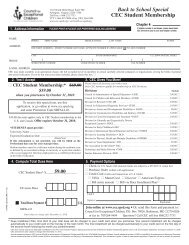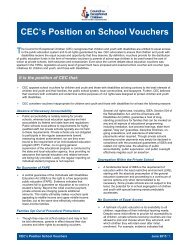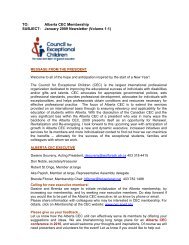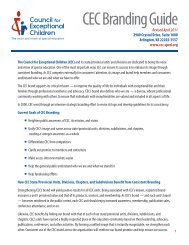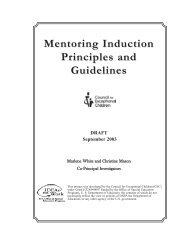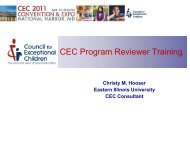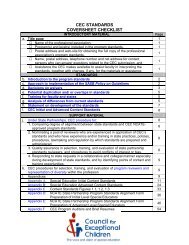What Every Must Know Special Educator - Council for Exceptional ...
What Every Must Know Special Educator - Council for Exceptional ...
What Every Must Know Special Educator - Council for Exceptional ...
You also want an ePaper? Increase the reach of your titles
YUMPU automatically turns print PDFs into web optimized ePapers that Google loves.
description of the unit’s philosophy of education and<br />
teacher preparation. The conceptual framework articulates<br />
how the unit’s graduates can be distinguished<br />
from other preparation programs in other institutions.<br />
The unit’s conceptual framework must be reflected in<br />
the unit’s responses to the six unit standards.<br />
Standard 1: Candidate <strong>Know</strong>ledge, Skills, and<br />
Dispositions<br />
It is through NCATE Unit Standard 1 that the various<br />
program level assessments demonstrate that candidates<br />
have mastered the content, pedagogical, and<br />
professional knowledge, skills, and dispositions to<br />
help all students learn. CEC Content Standards directly<br />
coordinate with NCATE Standard 1. In other words,<br />
program-wide assessments are designed to align with<br />
CEC Content Standards. It is through this relationship<br />
that the data from the program-wide assessments are<br />
linked to and used in NCATE Unit Standard 1.<br />
Standard 2: Assessment System and<br />
unit Evaluation<br />
The second standard deals with the systematic collection<br />
of data <strong>for</strong> the unit. Data must be collected<br />
on applicant qualifications, candidate and graduate<br />
per<strong>for</strong>mance, and unit operations. Once collected, the<br />
data must be analyzed and the findings used to make<br />
improvements.<br />
Standard 3: Field Experiences and Clinical<br />
Practice<br />
During field-experiences and clinical practice, candidates<br />
must demonstrate the knowledge, skills, and<br />
dispositions needed to help all students learn.<br />
Standard 4: Diversity<br />
The diversity standard applies to providing experiences<br />
with diverse students in P-12 settings and working<br />
with diverse higher education and school faculty<br />
and diverse fellow candidates.<br />
Standard 5: Faculty Qualifications,<br />
Per<strong>for</strong>mance, and Development<br />
Faculty must be qualified <strong>for</strong> their assignments with<br />
doctorates or exceptional expertise. Standard 5 also<br />
specifies that they model best practice in scholarship,<br />
service, and teaching and they must collaborate with<br />
colleagues in their disciplines and in schools.<br />
Standard 6: unit Governance and Resources<br />
The final standard ensures that the unit has the leadership<br />
and resources needed to prepare candidates. The<br />
review team will look at the budget, support personnel,<br />
facilities, and technology resources.<br />
unit and Program Assessments<br />
Unit accreditation and program recognition are two<br />
different processes based on different sets of standards.<br />
While program standards are program specific, unit<br />
standards, i.e., NCATE standards apply across programs<br />
that prepare educators and school personnel.<br />
This could mean employing two sets of assessments,<br />
one <strong>for</strong> the program and another set to be aggregated<br />
with the rest of the unit. The program assessment data<br />
feeds into common unit frameworks <strong>for</strong> documenting<br />
NCATE Standard 1.<br />
In the past, some programs attempted to use assessments<br />
designed at the unit level <strong>for</strong> program assessments.<br />
The assessment designed at the unit level by<br />
definition will not be program specific, as they must<br />
be sufficiently general to cover candidates across<br />
programs. For example, Assessment 4 the Student<br />
teaching/internship assessment is probably also a<br />
Unit assessment. This would be true <strong>for</strong> all programs<br />
in the Unit, but while a single instrument was used to<br />
allow <strong>for</strong> consistent data collection at the Unit level, <strong>for</strong><br />
the program reports the assessment must be aligned<br />
with the SPA standards. There<strong>for</strong>e, a single student<br />
teaching/internship assessment must be adjusted or<br />
amended to align specifically to CEC or other SPA<br />
standards.<br />
Your NCATE Coordinator and Program Assessment<br />
Coordinator can help you design assessments that<br />
collect the data needed <strong>for</strong> program recognition and<br />
they can see that you are also collecting the data the<br />
unit requires. Often the two sets of assessments can<br />
dovetail or complement each other.<br />
Transition Points<br />
The unit will specify decision or transition points that<br />
all candidates must pass. Often the points include<br />
admission to Teacher Education or the program, prestudent<br />
teaching, exit from student teaching, and a<br />
post-graduation follow-up. Transition points are also<br />
good times to collect program specific data. This data<br />
can be used to learn about new candidates. Follow-up<br />
in<strong>for</strong>mation can be extremely useful. Assessments can<br />
be especially useful if administered at key transition<br />
Appendix 10: developing A per<strong>for</strong>mAnCe -BASed progrAm ASSeSSment SyStem 285



